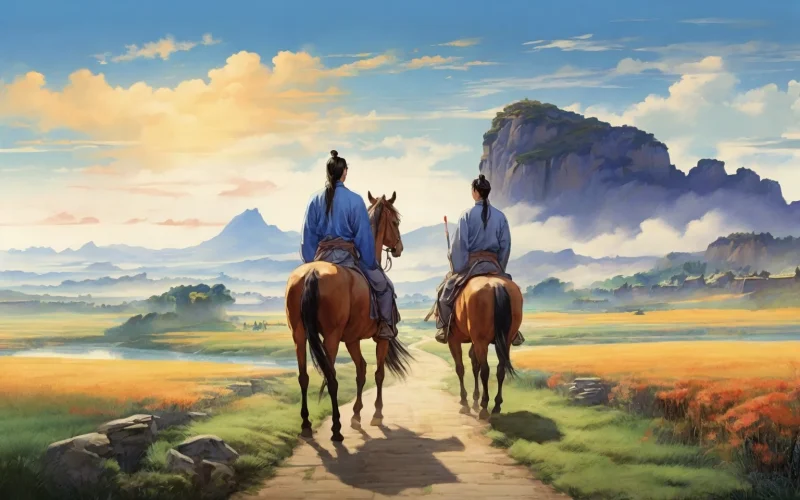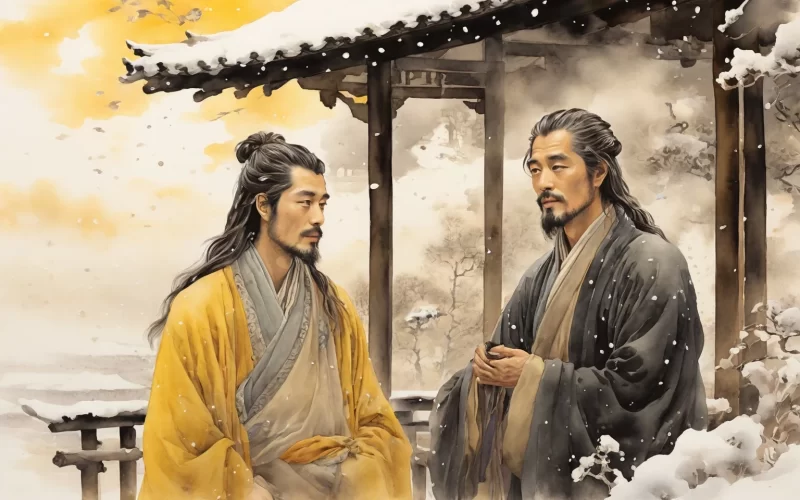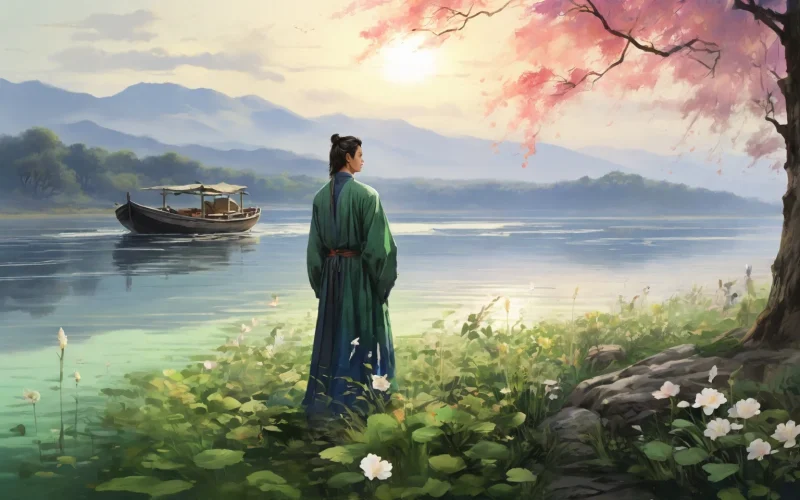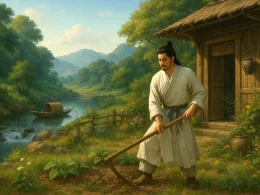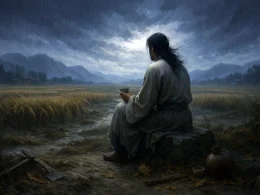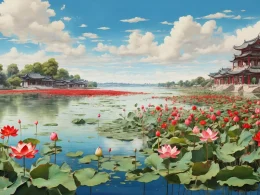I came at twenty with my sword and books
And visited the west capital town.
I gazed at your mansion with longing looks
And thought it easy to attain renown.
The emperor surpassed the ancient kings,
Music and rites were performed up and down.
He lavished on his favorites jade rings,
But unknown talents can't come near the Crown.
What could I do but come back to my land?
Going east, I could not do what I wish.
I cannot earn a living by the hand,
Nor would I with a hook and line catch fish.
For the world, like a common people I appear;
But for you, I am dear and near as a compeer.
From year to year I thank you for your friendly way;
You've not refused a helping hand, not for a day.
We play chess and on lute till day fades into night;
We drink and croon in spring with willows in delight.
We'll separate when our joy has not come to an end.
How can my heart not be grieved to part with my friend?
But men at parting should not grieve as women do,
So shed no tears at crossroads when we bid adieu!
Original Poem:
「别韦参军」
高适
二十解书剑,西游长安城。
举头望君门,屈指取公卿。
国风冲融迈三五,朝廷欢乐弥寰宇。
白璧皆言赐近臣,布衣不得干明主。
归来洛阳无负郭,东过梁宋非吾土。
兔苑为农岁不登,雁池垂钓心长苦。
世人遇我同众人,唯君于我最相亲。
且喜百年见交态,未尝一日辞家贫。
弹棋击筑白日晚,纵酒高歌杨柳春。
欢娱未尽分散去,使我惆怅惊心神。
丈夫不作儿女别,临岐涕泪沾衣巾。
Interpretation:
"Farewell to Wei, a Military Officer by Gao Shi" was written by the Tang Dynasty poet Gao Shi to bid farewell to his friend Wei Canjun. As Wei Canjun prepares to leave, the poet reflects on his own unsuccessful pursuit of an official position in the capital and his disappointment from his travels in Liang and Song. He expresses his feelings of despair in adversity and the deep friendship with Wei Canjun, ultimately revealing his endless affection for this friendship in the final emotional farewell.
First couplet
"二十解书剑,西游长安城。"
(At the age of twenty, I laid down my books and sword and set out for Chang'an.)
These two lines describe the poet's youthful determination and ideals. He gives up both scholarly and martial pursuits to chase his ambitions for an official career, expressing his confidence and dreams for the future. The phrase "laid down my books and sword" symbolizes leaving behind his past life and embarking on a new journey in Chang'an.
Second couplet
"举头望君门,屈指取公卿。"
(Looking up at your gate, I count the days to become a high-ranking official.)
This couplet reflects the poet's expectations and aspirations for his career in the imperial court. By "looking up," the poet expresses his desire to enter the ruler's field of vision, hoping to attain an official position. However, the phrase "counting the days" implies that his goal seems distant and difficult to achieve, hinting at the poet's frustration and disillusionment with his unattainable ambitions.
Third couplet
"国风冲融迈三五,朝廷欢乐弥寰宇。"
(The country's morals and customs thrive, and the court's culture spreads across the land, surpassing the times of the Three Sovereigns and Five Emperors.)
These lines, while seeming to praise the flourishing state of the country, actually contain a tone of satire and discontent. The poet suggests that the ideal "era of peace" he had envisioned has not brought the reforms or opportunities he expected. The seemingly prosperous state is merely superficial, and it offers no real chances for him to fulfill his ambitions.
Fourth couplet
"白璧皆言赐近臣,布衣不得干明主。"
(The ruler gifts white jade to his close ministers, while common folk cannot approach the wise ruler.)
This couplet continues the theme of the poet's disappointment with his failed ambitions. "White jade" symbolizes rewards, while "common clothes" represent ordinary people. The poet laments that without powerful connections, he, like other common people, has no chance of gaining the ruler's favor.
Fifth couplet
"归来洛阳无负郭,东过梁宋非吾土。"
(When I return to Luoyang, there is no wealth to rely on; crossing through Liang and Song, they are no longer my homeland.)
These two lines depict the poet's sense of isolation. Even if he returns to Luoyang, his family lacks the resources to support him. His journey through Liang and Song represents a life of wandering, as they are no longer places he considers home, highlighting his inner loneliness and lack of roots.
Sixth couplet
"兔苑为农岁不登,雁池垂钓心长苦。"
(Working the land at the Rabbit Garden, the crops fail every year; fishing at the Goose Pond, my heart remains filled with sorrow.)
The poet uses the ancient sites of "Rabbit Garden" and "Goose Pond" to describe his struggles in poverty. The Rabbit Garden and Goose Pond, once places of leisure, now symbolize the poet's hardship. The act of "fishing" refers to waiting for an opportunity, just as Jiang Taigong waited by the Wei River, yet the poet's fate remains unchanged.
Seventh couplet
"世人遇我同众人,唯君于我最相亲。"
(While others treat me as they do everyone else, only you, my friend, show true affection.)
This line reveals the poet's deep friendship with Wei Canjun, contrasting it with the superficial relationships with others. The poet feels that only Wei Canjun truly understands him and is his closest companion.
Eighth couplet
"且喜百年见交态,未尝一日辞家贫。"
(I am glad that our friendship has lasted for a century, and you have never distanced yourself because of my poverty.)
These lines reflect the long-standing and deep friendship between the poet and Wei Canjun. The poet expresses gratitude for Wei's unwavering support, highlighting that Wei never abandoned him due to his financial struggles.
Ninth couplet
"弹棋击筑白日晚,纵酒高歌杨柳春。"
(We play chess, striking the zither as the evening falls; then we drink and sing, enjoying the spring air beneath the willows.)
These lines describe the joyful time the poet spent with Wei Canjun, playing games, drinking, and singing. It emphasizes their carefree and deep friendship, capturing the joy and carefree nature of their bond.
Tenth couplet
"欢娱未尽分散去,使我惆怅惊心神。"
(Though our joy is not yet finished, we must part, and it fills me with sorrow and unease.)
This line captures the sorrow and hesitation the poet feels at the moment of parting. Even though their time together has not yet ended, the poet’s heart is filled with sorrow and unease, revealing his emotional turmoil.
Eleventh couplet
"丈夫不作儿女别,临岐涕泪沾衣巾。"
(A man should not shed tears like a child when parting, yet at the crossroads, my tears wet my sleeve.)
This line reveals the poet's conflicted feelings as he bids farewell. Although he wants to appear strong and resolute like a man, his emotions are too overwhelming to suppress, and his tears betray the depth of his sorrow.
Writing Features
This poem, through a heartfelt monologue, depicts the poet's inner turmoil. The language is concise yet full of emotion, with feelings gradually intensifying. Especially in the depiction of disappointment, adversity, and farewell, the poet delicately portrays the complexity and authenticity of the inner self. The entire poem creates vivid emotional layers through the use of contrast and occasional phrasing.
Overall Appreciation
"Farewell to Wei Canjun" is not only a farewell poem but also a true reflection of the poet's emotions. By recalling his deep friendship with Wei Canjun, the poet intertwines his own sense of loss and helplessness in his official career and life with the pain of parting. Through simple language, the poet expresses the agony of departure and the sincerity of friendship, filling the entire poem with deep emotional power.
Poem translator:
Xu Yuan-chong (许渊冲)
About the poet:
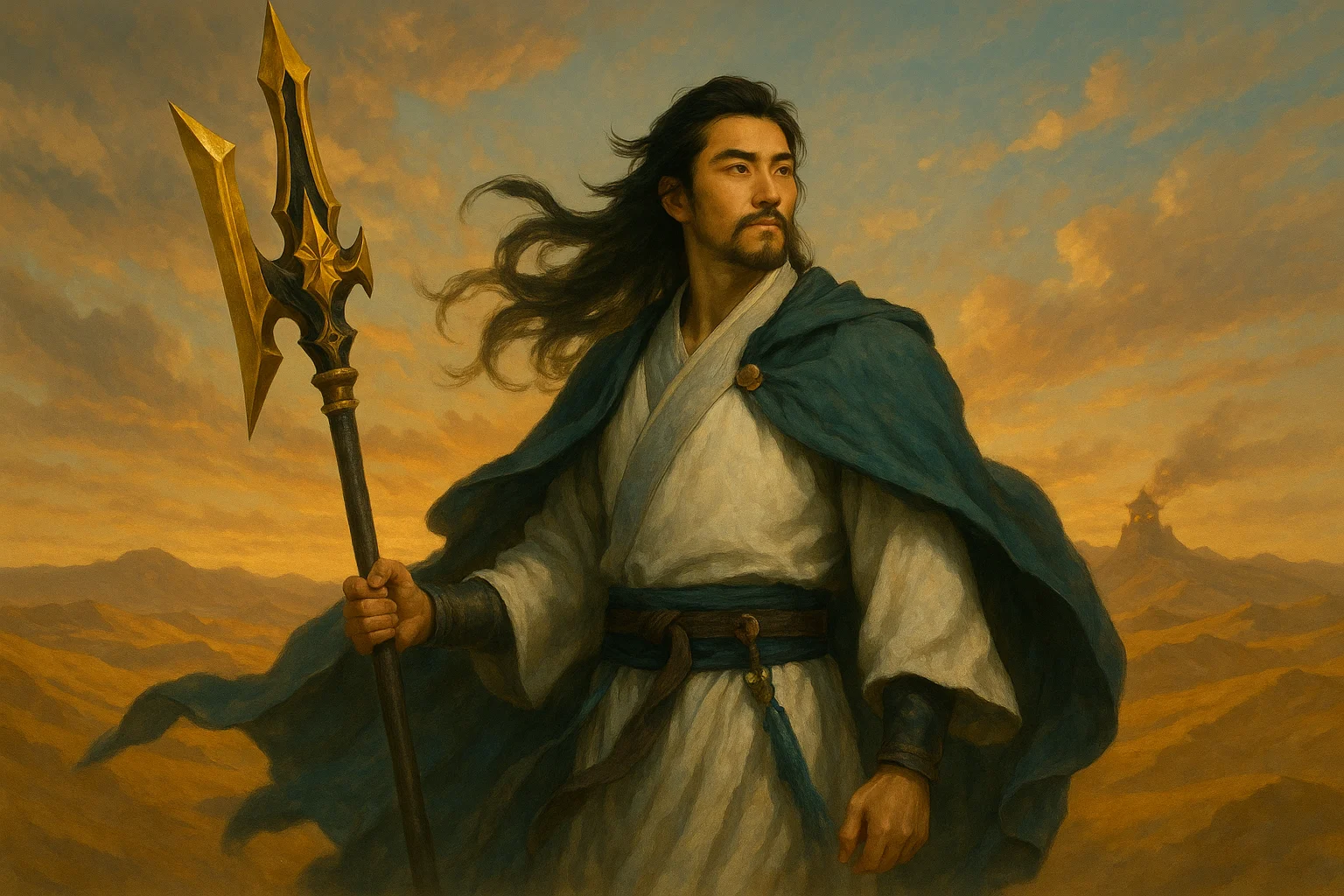
Gao Shi (高适), 706 - 765 AD, was a native of Jing County, Hebei Province. In his early years, his family was poor, and he was disappointed in his career. He was famous for his border poems, which are not only numerous and wide in subject matter, but also present a unique style and perspective.






